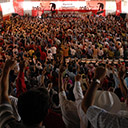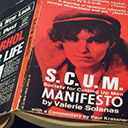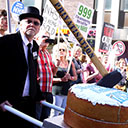
Not so long ago, the social contract between workers, government, and employers made college a calculable bet. We built a university system for the way we worked. What happens to college when that social contract is broken—when we work not just differently but for less? And what if the crisis in higher education is related to the broader failures that have left so many workers struggling?

At first glance the runways of New York and the factories of Bangladesh couldn’t seem farther apart. But they are part of the same $1.5 trillion industry, where the work is overwhelmingly performed by young women and girls. Can a new wave of organizing, from the sweatshop floor to the offices of Condé Nast, turn that industry around?

“In sub-Saharan Africa,” a video at the 2014 Consumer Electronics Show announces, “there is war that feeds off of global demand for electronics. The place is the DRC—the Democratic Republic of the Congo. The region is ground zero for conflict minerals.” Tech giants including Intel and Apple are now working with NGOs to clean up their supply chains and help promote peace in the region. But will their proposed solutions challenge the deeper patterns of exploitation plaguing the DRC?

Is there such a thing as a leftist foreign policy? What are the characteristic views of the left about the world abroad? When have leftists, rightly or wrongly, defended the use of force?

“Is there racism against drones?” asked an audience member at the Drones and Aerial Robotics Conference in New York City last autumn. Drone hobbyists are seeking to divorce their toys from images of war and bloodshed. But even hobbyist drones are the product of extremely powerful institutions with a keen interest in maintaining that power.

The art campaign Wages for Facebook is an attempt to unsettle the digital marketization of our relationships that many of us have already come to accept as normal.

The National Front of Popular Resistance (FNRP) emerged out of the opposition to Honduras’s 2009 coup and quickly developed into the largest social movement in Honduran history. Will it be able to turn things around in a country known for having the worst poverty and inequality in Latin America?

In the tech community, the plight of homeless people has gone from being an unnoticed barnacle of urban life to a cause at once mourned, criticized, and celebrated. For many in Silicon Valley, homeless people are the “noble savages” of today.
Editors: Eric Arnesen’s review (Fall 2013) of Henry Wallace’s 1948 Presidential Campaign and the Future of Postwar Liberalism, Thomas Devine’s book on Henry Wallace, troubled me, less because of what it said than because of what it didn’t. I have …

It is hard to resist a technology that is also a tool of pleasure. The Luddites smashed their power looms, but who wants to smash Facebook—with all one’s photos, birthday greetings, and invitations? New digital technologies, particularly social media, make money by encouraging us to spend our lives on their platforms; they try to turn labor that was previously paid, from drone development to sex work, into play for unpaid amateurs. To what end?
The 1964 Civil Rights Act certainly deserves a shower of golden anniversary tributes. Thanks to what Clay Risen, in his new book about its passage, calls “the Bill of the Century,” most Americans now assume and most welcome the fact …

Valerie Solanas: The Defiant Life of the Woman Who Wrote SCUM (and Shot Andy Warhol) by Breanne Fahs The Feminist Press, 2014, 352 pp. Late last year former NYPD Commissioner Ray Kelly visited Brown University to deliver a lecture on …

When he started working at the Tenth Amendment Center three-and-a-half years ago, Communications Director Mike Maharrey could recite every bill that dealt with the nullification of federal law across the United States, even if most were toothless, non-binding resolutions. In …
When my uncle Joe Meraglio was discharged from the Navy after the Second World War, he, like other young men in his Rust Belt town, went back to work for the Pennsylvania Railroad. But the railroad industry was beginning its …

Less than two years after the fall of Nazi Germany, a bankrupt Britain—reeling from the most destructive war in history and living under conditions of stark austerity—elected to create an extraordinary system of universal health care, the National Health Service …



















